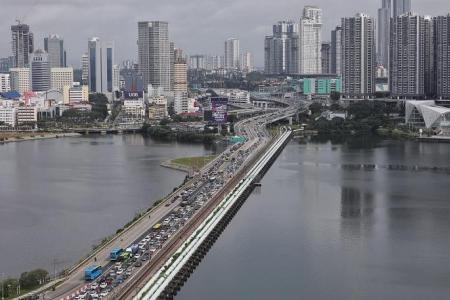Slew of projects to ease congestion at Johor land crossings, says top Malaysian official
A special Malaysian government committee is implementing a slew of projects in stages to address vehicle and human traffic congestion at the country’s two land crossings with Singapore, Home Ministry secretary-general Wan Ahmad Dahlan Abdul Aziz said on Saturday.
The projects include adding 25 automated clearance points for Malaysian motorcyclists, upgrading of the bus terminal at the Gelang Patah Customs, Immigration, and Quarantine (CIQ) Complex, and studying toll payments using radio frequency identification (RFID) for vehicles from Singapore.
The Immigration Department said last week that at least 12 of the 48 vehicle lanes at the Gelang Patah CIQ can now be changed into “contra lanes” to ease incoming traffic from Singapore on Malaysia’s polling day, Nov 19. This means the 12 lanes which are normally used for vehicles exiting Johor can be quickly changed to receive vehicles coming from Singapore.
Datuk Seri Wan Ahmad said the Special Committee on Congestion has introduced 23 initiatives to address congestion at the land crossings in Bangunan Sultan Iskandar (BSI) at the Causeway, and at the Sultan Abu Bakar Complex (KSAB) at the Second Link.
The Johor-Singapore border crossings are among the world’s busiest. Before the coronavirus pandemic, about 415,000 people used the Causeway and the Tuas Second Link daily.
As of Nov 9, Mr Wan Ahmad said, 13 of the 23 initiatives have been completed. Six more are being implemented and four projects have yet to be started.
“This committee was set up as a platform to coordinate and keep track of all 23 initiatives through five technical working groups,” he said in a statement.
“The implementation of all these initiatives is an integrated effort of all parties involved in the Johor Causeway aimed not only at reducing congestion... but also to improve the effectiveness of service delivery to the people.”
He said the committee would add a roof to the bus parking area at KSAB for the convenience of commuters, and it was looking for solutions with an increasing number of people using bus services “that exceeds the capacity” at both BSI and KSAB.
Mr Wan Ahmad added that future planning would take into account the proposed use of RFID, or Malaysia’s MyRFID technology, by at least 65,000 vehicles from Singapore registered with the Road Transport Department at the country’s entry points.
Get The New Paper on your phone with the free TNP app. Download from the Apple App Store or Google Play Store now

